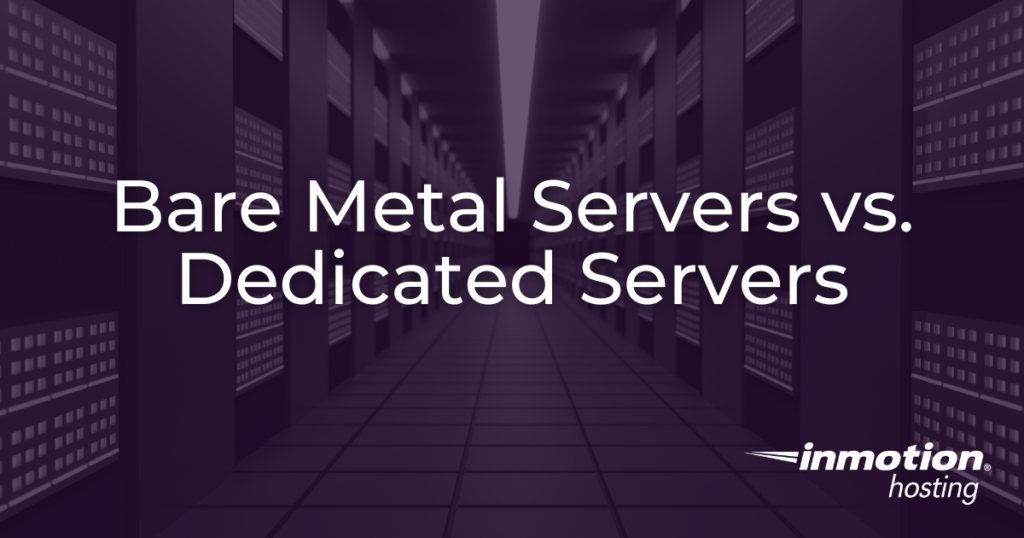
There is a wealth of information online describing the differences between bare metal servers and dedicated servers.
Describing the difference can be challenging because the term ‘bare metal’ can have a different meaning depending on the user.
Many online articles that cover the differences are either filled with unnecessary information and lack in-depth details or present information in absolutes that may not be universally applicable.
In this article, we aim to eliminate any confusion between bare metal and dedicated servers.
If bare metal hosting is new to you, we recommend reading this article to learn more about what is a bare metal server.
Overview
While ‘bare metal servers’ and ‘dedicated servers’ are often used interchangeably, their meanings can vary slightly depending on the context. In essence, both terms, generally, denote physical servers dedicated to a single customer, rather than being shared among multiple users.
In contrast to other types of hosting, such as Shared Hosting or VPS Hosting, where users share the physical server, bare metal, and dedicated servers are exclusively dedicated to a single user.
Is a Bare Metal Server a type of Dedicated Server?
Yes, a bare metal server falls under the category of dedicated servers. The term ‘dedicated server’ generally encompasses a physical server exclusively allocated to a single customer or user, as opposed to being shared among multiple users. With a dedicated server, the customer enjoys complete control and access to the server’s resources.
Common Bare Metal Myths Found Online
Myth 1: Hardware
In terms of hardware, bare metals servers have a clear competitive edge over traditional dedicated servers. Whether it is the newest generation of Intel Xeon Processors or DDR4 Random Access Memory with Error Correcting Code (ECC), bare-metal servers come with all the latest technologies. Likewise, the storage technology used in these servers is also superior, with the adoption of NVMe solid-state drives (SSDs) instead of standard SATA SSDs and hard drives.
This is an example of information we’ve found online that speaks in absolutes. While certain bare metal server providers may offer superior hardware, it’s essential to note that this isn’t universally true in every case.
Take our CC-3000 Dedicated Server and CC-3000 Bare Metal Servers for example:
| Ram | Disk | Cores / Treads | |
|---|---|---|---|
| CC-3000 Dedicated Server | 512GB DDR4 RAM | 2×3.2TB NVMe SSD | 32 Core / 64 Thread |
| CC-3000 Bare Metal Server | 512GB DDR4 RAM | 2×3.2TB NVMe SSD | 32 Core / 64 Thread |
As you can see, they are the same server. The key distinction is that a Dedicated Server is managed, while a Bare Metal Server is unmanaged. We’ll dive into this difference in more detail later in the article.
Myth 2: Billing Term Length
The most noteworthy difference between bare metal and dedicated servers is in terms of pricing or cost. Dedicated servers offer traditional payment plans, which allow you to set monthly or yearly contracts that can easily be compared in total cost across the industry. On the other hand, bare-metal servers provide more flexible per-hour billing plans that enable you to pay for only what you use.
We went through the checkout process with several bare metal server providers. As you can see, the available billing cycles differ from provider to provider. It’s important to note that hourly billing is not a defining feature that distinguishes a dedicated server from a bare metal server; this is another instance of a misleading absolute.
| Bare Metal Provider | Server | Hourly billing available? | Billing cycles available |
|---|---|---|---|
| InMotion Hosting | Elite | No | Monthly, 1 year |
| OVH | Rise-APAC | No | Monthly, 1 year, 2 year |
| GTHost | All Instant Servers | No | Daily, Monthly, 1 year |
| HostKey | gpu.v3-ultra | No | Monthly, 1 year |
InMotion Hosting Dedicated Servers vs. Bare Metal Servers
As mentioned earlier, the distinction between a dedicated server and a bare metal server can vary depending on the hosting provider you consult.
At InMotion Hosting, the primary distinction is that our dedicated servers are ‘managed,’ while our bare metal servers are ‘unmanaged.
Our managed servers usually come with cPanel or another web hosting control panel pre-installed for the user. If you’re building a website, your managed server will be set up and ready to use. All you need to do is install your preferred software and get started. Additionally, our managed servers include Launch Assist, a service by our Managed Hosting team to help you get up and running.
Our Unmanaged servers do not come with cPanel or another control panel pre-installed. Instead, the choice is yours on whether you want to install a control panel yourself or run your website by individually installing the necessary components, such as the Apache web server. Advanced and experienced users typically choose unmanaged servers. Consequently, the Launch Assist service from our Managed Hosting team is not included by default.
| Managed Hosting | Unmanaged Hosting | |
|---|---|---|
| Control Panel | cPanel and Control Web Panel | Not included by default |
| Operating System | Many operating systems are available | Not included; advanced users able to administer their own server |
| Launch Assist | Included; Our Managed hosting team can help with custom server configurations | Not included; advanced users able to administer their server |